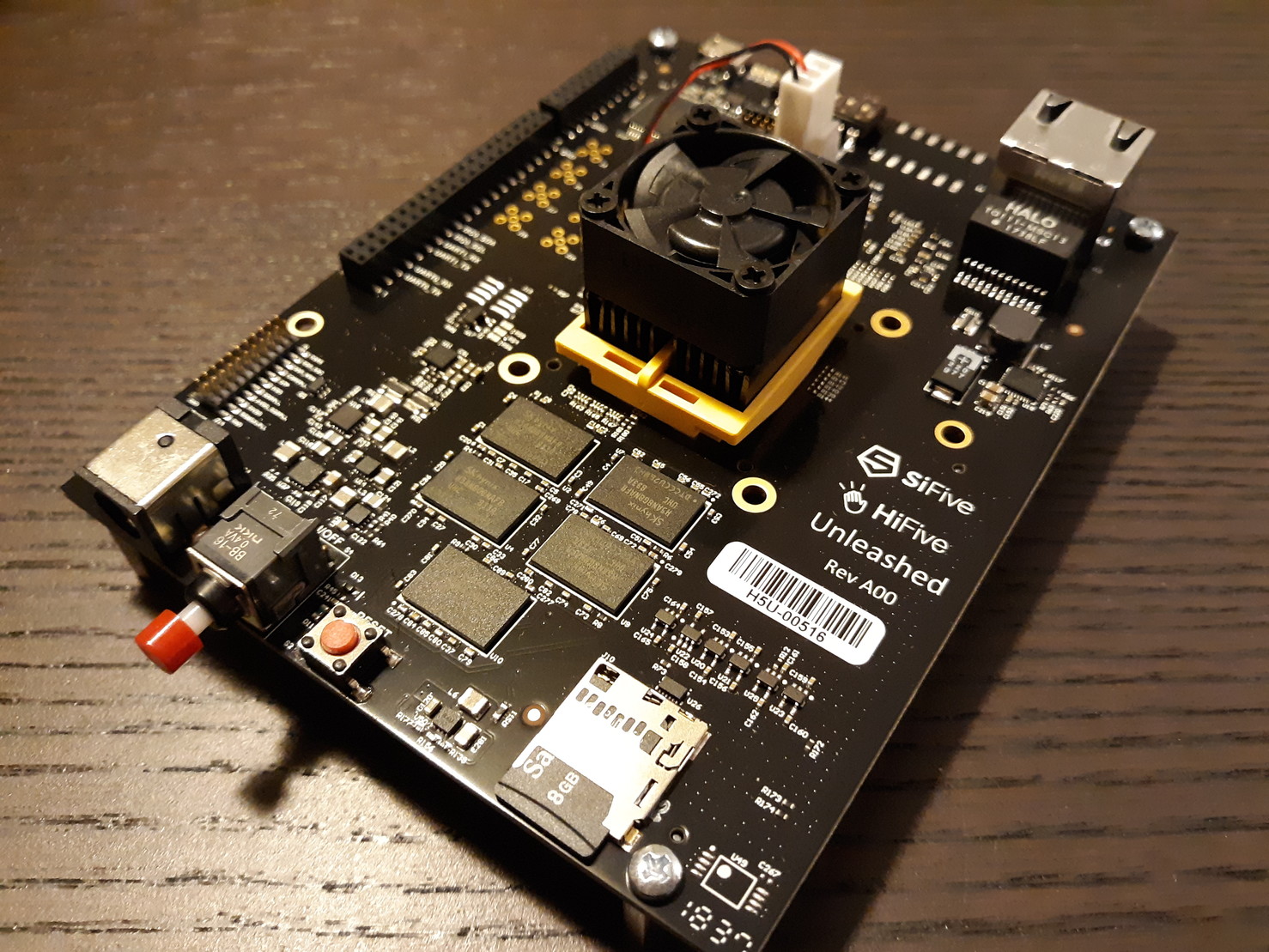I recently received my HiFive Unleashed, after several excruciating months of waiting, and it’s incredibly cool. For those unaware, the HiFive Unleashed is the first consumer-facing Linux-capable RISC-V hardware. For anyone who’s still lost, RISC-V is an open, royalty-free instruction set architecture, and the HiFive is an open CPU implementing it. And here it is on my dining room table:

This board is cool. I’m working on making this hardware available to builds.sr.ht users in the next few months, where I intend to use it to automate the remainder of the Alpine Linux port and make it available to any other operating systems (including non-Linux) and userspace software which are interested in working on a RISC-V port. I’m fairly certain that this will be the first time hardware-backed RISC-V cycles are being made available to the public.
There are two phases to porting an operating system to a new architecture: bootstrapping and, uh, porting. For lack of a better term. As part of bootstrapping, you need to obtain a cross-compiler, port libc, and cross-compile the basics. Bootstrapping ends once the system is self-hosting: able to compile itself. The “porting” process involves compiling all of the packages available for your operating system, which can take a long time and is generally automated.
The first order of business is the cross-compiler. RISC-V support landed in
binutils 2.28 and gcc 7.1 several releases ago, so no need to worry about adding
a RISC-V target to our compiler. Building both with
--target=riscv64-linux-musl is sufficient to complete this step. The other
major piece is the C standard library, or libc. Unlike the C compiler, this step
required some extra effort on my part - the RISC-V port of musl libc, which
Alpine Linux is based on, is a work-in-progress and has not yet been upstreamed.
There does exist a patch for RISC-V support, though it had never been tested at a scale like this. Accordingly, I ran into several bugs, for which I wrote several patches (1 2 3). Having a working distro based on the RISC-V port makes a much more compelling argument for the maturity of the port, and for its inclusion upstream, so I’m happy to have caught these issues. Until then, I added the port and my patches to the Alpine Linux musl package manually.
A C compiler and libc implementation open the floodgates to porting a huge volume of software to your platform. The next step is to identify and port the essential packages for a self-hosting system. For this, Alpine has a great bootstrapping script which handles preparing the cross-compiler and building the base system. Many (if not most) of these packages required patching, tweaks, and manual intervention - this isn’t a turnkey solution - but it is an incredibly useful tool. The most important packages at this step are the native toolchain1, the package manager itself, and various other useful things like tar, patch, openssl, and so on.
Once the essential packages are built and the system can compile itself, the long porting process begins. It’s generally wise to drop the cross-compiler here and start doing native builds, if your hardware is fast enough. This is a tradeoff, because the RISC-V system is somewhat slower than my x86_64 bootstrap machine - but many packages require lots of manual tweaks and patching to get cross-compiling working. The time saved by not worrying about this makes up for the slower build times2.
There are thousands of packages, so the next step for me (and anyone else working on a port) is to automate the remainder of the process. For me, an intermediate step is integrating this with builds.sr.ht to organize my own work and to make cycles available to other people interested in RISC-V. Not all packages are going to be ported for free - but many will! Once you unlock the programming languages - C, Python, Perl, Ruby3, etc - most open source software is pretty portable across architectures. One of my core goals with sr.ht is to encourage portable software to proliferate!
If any readers have their own RISC-V hardware, or want to try it with qemu, I have a RISC-V Alpine Linux repository here4. Something like this will install it to /mnt:
apk add \
-X https://mirror.sr.ht/alpine/main/ \
--allow-untrusted \
--arch=riscv64 \
--root=/mnt \
alpine-base alpine-sdk vim chrony
Run /bin/busybox --install and apk fix on first boot. This is still a work
in progress, so configuring the rest is an exercise left to the reader until I
can clean up the process and make a nice install script. Good luck!
Closing note: big thanks to the help from the community in #riscv on Freenode, and to the hard work of the Debian and Fedora teams paving a lot of the way and getting patches out there for lots of software! I still got to have all the fun working on musl so I wasn’t entirely on the beaten path :)